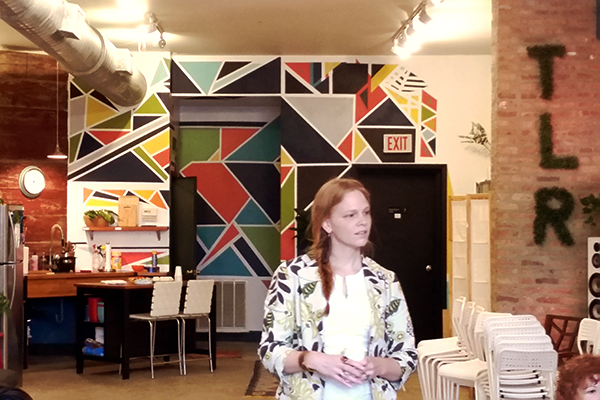Melissa Pierce doesn’t enjoy being high. And she’s the first to admit that building a national network for women to talk about their experiences with marijuana is not something she expected to do.
Last Thursday night, Pierce shared her hesitation to get involved in the industry—and why she was eventually persuaded to do so—with a group of about a dozen women ranging in age from their mid-20s to their mid-70s at the inaugural Chicago Women and Cannabis Wellness meet-up.
The 41-year-old entrepreneur is the founder of Chicago Women Developers, a group that encourages and teaches women how to get into the male-dominated tech industry. Pierce, a Rogers Park resident, says she saw an opportunity to carve out space for women in another similarly male-dominated industry: cannabis. Along with Alaska-based Aliza Sherman, a fellow tech entrepreneur and women’s issues advocate, she co-founded Ellementa, “an on- and off-line space where women can get together and talk about health and well-being and their use of cannabis,” which hosted the event.
Women who showed up at the Living Room in Wicker Park were offered a chance to share what brought them to the meet-up and their previous experiences with cannabis. The goal, Pierce says, is to offer an alternative to what she described as the male-focused image of cannabis users as “backwards-hats-wearing bong guys and women in tiny, tiny outfits getting super high on whatever.”
Nearly all of the women at the meet-up said they either experimented minimally with the drug in their youth, or they abstained from weed entirely. Marijuana “was in and out of my life in my younger years and, from age 35 on, I pretty much did not use it because I preferred a martini and I couldn’t do both,” said Ellen Floren, co-owner of Resq Organics, a company that sells, among other things, cannabidiol-infused products to treat skin conditions in both animals and humans.
Though the event was not meant to talk about cannabidiol specifically, CBD—one of more than 80 cannabinoid chemicals found in marijuana and hemp—was a focus of the conversation. Unlike the more widely known THC, CBD has no psychological effects (it is sought for its purported physical therapeutic effects), and due to a patchwork of state and federal legislation, it can be marketed and sold outside of Illinois’s strictly regulated medical marijuana program.
Floren and her business partners, Hope Black and Arleen Floren, spoke emphatically about the success they’ve had treating themselves and their animals with CBD, and the positive feedback they say they’ve received from clients. Co-owner of the Living Room, Marcy Capron Vermillion, said she’s not a fan of weed, but has found significant benefits from CBD including relief from a herniated disc and panic disorder.
But not everyone was quite so enthusiastic.
An older woman named Carol (who preferred to use only her first name) said she tried the stuff, or something that at least purported to be CBD, and found that it exacerbated her depression rather than relieved it. She's still interested in cannabis-related options to treat her fibromyalgia, though, and plans to apply for a medical marijuana card soon.
“I’m mixed up with all this. It’s brand new to me,” she told the group.
People like Carol are Ellementa’s target audience, Pierce says. She hopes these kind of meetups (also planned for Denver; Portland, Oregon; Seattle; and Anchorage) will plant the seeds for local support networks, primarily for Gen Xers and Baby Boomers. Longtime pot consumers will get a safe haven to talk about how weed has affected their lives and their health without fear of judgment or shame, she says. And “for the woman who is curious, she can hear real stories from real women who are dealing with health issues or wellness issues who are using marijuana to help themselves or those in their family,” Pierce explains.
Most of the women present expressed frustration with marijuana's ambiguous legal status, hoped that the current medical program could be expanded, and wanted state lawmakers to approve proposed legislation for recreational marijuana.
The drug’s limited legality in Illinois contributes to a dearth of information about its myriad effects, strains and forms, Pierce says, and that lack of awareness is an issue she strives to remedy. That was made clear at the event when a woman named Sharon (who also preferred to use only her first name) spoke up about her painful arthritis and the panic attacks she’s experienced after a recent car accident.
Though medical marijuana is legal in Illinois, she said that it’s rarely talked about, so she came to the meet-up Thursday looking for more information. “I’m just very happy you put this together,” she told Pierce. “Because there is a need and a service in the community to do this."



